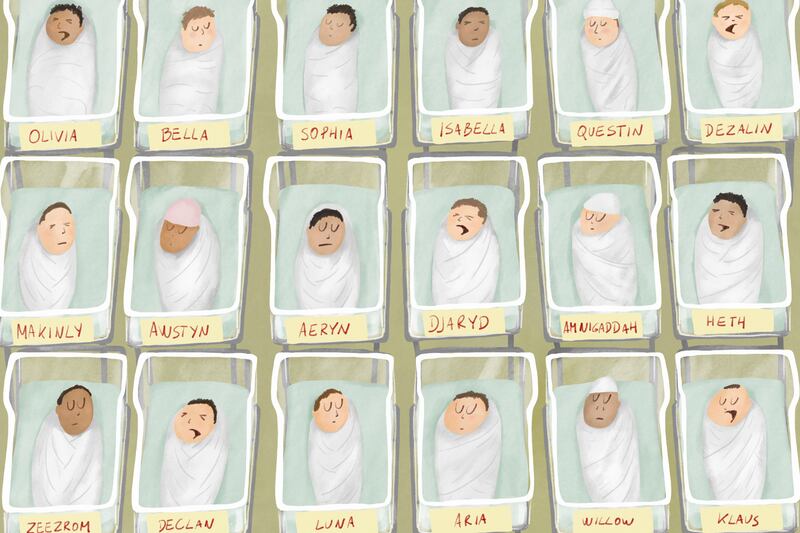Birthrates have been falling in America, with a particularly sharp downward spike in early 2021 — an event demographers dubbed a “historic baby bust.”
But a July 2021 analysis by demographer Lyman Stone and sociologist W. Bradford Wilcox for the Institute for Family Studies suggests that the baby bust is over. And with more births comes more newborns in need of a name. So who are the babies being born in 2021, and what do their names say about them?
I, with my own unique moniker, am invested in the special task of investigating how and why we choose names for children. When asked for my name in a coffee shop or doctor’s office, I often recite the same spiel: “Fendi. F as in Frank-E-N-D-I as in igloo.” It’s odd to say the word “igloo” to a stranger with no context, but after decades of being called Cindy or Sandy or, as one barista wrote in Sharpie, “Fungi,” it’s a handy default.
“Oh, Fendi like the bag!” the person will comment as I smile at a riff I’ve endured too many times to count.
Most of us move through life with a name we didn’t choose. It was bestowed upon us at birth and will survive us after death. It is cherished by loved ones and inked onto thousands of documents.
It is not impossible for a person to be nameless, but to legally exist — with a Social Security number, driver’s license or bank account — requires a string of letters to call your own.
To that end, the convention of naming is mandatory. But there are greater reasons why parents name their children, owners name their pets and Jeff Bezos named his virtual assistant Alexa.
Sherri Suzanne, founder of My Name for Life — a professional baby name consulting service — believes we name for two reasons. The first is identification and differentiation. The second is to create familiarity and intimacy.
“Names are a special part of language,” she says. “Anthropologists have not identified a society that does not use names in some form.”
The earliest names derived from language and had lofty meanings. Indigenous Native American names like Adsila and Galiahi mean “blossom” and “attractive” in Cherokee. Ancient Roman names Lucius and Titus come from the Latin words for “light” and “honor.”
As societies have evolved, we have drifted away from etymology or family namesakes and moved toward pleasing phonetics with intrinsic value.
Nowadays, parents chase individuality, Suzanne says, but they’re not as adventurous as you’d imagine. Zany names celebrities pick for their children aren’t being copied.
“The goal today is a familiar name that will not be shared with too many classmates,” she says. “A name that will help their child stand out while still fitting in.”
Names can influence how people perceive us and how we are treated in everyday encounters and business. In Germany and the United States, studies have found that men with names with fewer letters brought home more money, perhaps under the pretense that if his name is simple and easy to remember, he is approachable and friendly. Dirks and Klauses were found to excel in Germany, and Lynn, Dana, Tom and Rob were among the most common names for American CEOs. Each additional letter in a name correlates with a $3,600 drop in annual salary.
Where there are minimalists, there are also maximalists. In Utah, it would appear that more is, indeed, more. Inventive names like Questin, Dezalin or Makinly, and brazen spellings of usual names like Awstyn, Aeryn or Djaryd — all of which would make a killing in a game of Scrabble — go unquestioned.
One Utah native and writer, Haley Swenson, theorizes the state churns out funky names partly because of its relatively homogenous demographics: largely white, largely Latter-day Saint and largely comprising a number of newborns needing a name (the state has the highest birthrate in the country). To stand out in a crowd of kids who look like you, come from a similar background and are of the same faith may require a name like Taeg.
Today’s trending names — Luna, Aria and Willow to name a few — are less about gender, heritage or status. Phonetics are important and spelling leaves room for creativity, but — above all — a name should simply feel right.
“Great names are those that people can say with confidence throughout their lives, whether introducing themselves on the playground or in the boardroom,” Suzanne says.
I didn’t always appreciate my name. It felt kitschy growing up, and finding my first name initial on a mug or a keychain has always been a losing battle (“F” is not a high-inventory letter).
But as an adult I’ve come to enjoy being the only Fendi in the room. It is uniquely me, which is the whole point.
This story appears in the September issue of Deseret Magazine. Learn more about how to subscribe.

